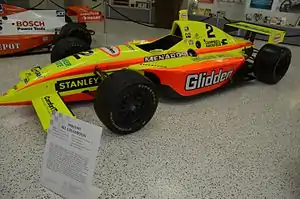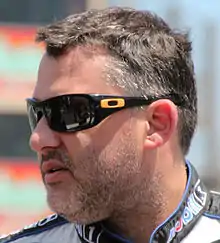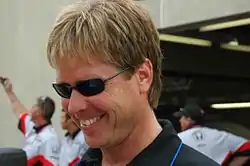1996–97 Indy Racing League
The 1996–97 Indy Racing League was the second season contested by the Indy Racing League. Tony Stewart was the champion, while Arie Luyendyk won the Indianapolis 500. The lengthy season was a result of the league abandoning the concept of ending each season with the Indianapolis 500. The 1996–97 season would ultimately consist of the two races that followed the Indy 500 in the calendar year of 1996, and all events contested in the calendar year of 1997. It also saw the introduction of a new chassis and engine package.
| 1996–1997 Indy Racing League season | |
|---|---|
| Indy Racing League | |
.png.webp) 1996–97 Indy Racing League | |
| Season | |
| Races | 10 |
| Start date | August 18, 1996 |
| End date | October 11, 1997 |
| Awards | |
| Drivers' champion | |
| Indianapolis 500 winner | |
The 1996–97 season was originally scheduled to begin at New Hampshire in August 1996 and end with the Indianapolis 500 in May 1997. At some point in the summer of 1996, the consensus regarding the unusual split-calendar season was decidedly unfavorable. Omitting the normal winter offseason caused potential difficulty with driver contracts, sponsor contracts, and equipment purchasing, which all traditionally followed a calendar-based schedule.[1] In addition, the months of November, December, and most of January were not expected to be filled with race dates, since few suitable venues (outside of Orlando) were available in warm-weather locations. It was felt the long winter gap between races was disruptive and disjointed, and came at a time of year when auto racing was traditionally on hiatus anyway.
Following the 1996 races at New Hampshire and Las Vegas, on October 9, 1996, the Indy Racing League announced that the league would revert to a calendar-based schedule for 1998.[1] To avoid awarding four championships in less than two and a half years, all events contested in the calendar year of 1997 were added to the two aforementioned races held in 1996. Now combined, a single seventeen-month 1996–1997 championship would be awarded in October 1997.
The two remaining races in 1996 (New Hampshire and Las Vegas) were contested with the same equipment as the 1996 season. All races that took place in the calendar year of 1997, starting with the race at Orlando, were contested with all new purpose-built oval chassis from G-Force and Dallara with stock block naturally aspirated 4.0 liter V8's from Oldsmobile and Infiniti. Only seven drivers competed in all ten races of this seventeen-month-long marathon schedule.
Teams and drivers
Season Summary
Schedule

| Rd | Date | Race Name | Track | City |
|---|---|---|---|---|
| 1 | August 18 | True Value 200 | New Hampshire International Speedway | Loudon, New Hampshire |
| 2 | September 15 | 1996 Las Vegas 500K | Las Vegas Motor Speedway | Las Vegas, Nevada |
| 3 | January 25 | Indy 200 at Walt Disney World | Walt Disney World Speedway | Bay Lake, Florida |
| 4 | March 23 | Phoenix 200 | Phoenix International Raceway | Phoenix, Arizona |
| 5 | May 26–27 | 81st Indianapolis 500 | Indianapolis Motor Speedway | Speedway, Indiana |
| 6 | June 7 | True Value 500 | Texas Motor Speedway | Fort Worth, Texas |
| 7 | June 29 | Samsonite 200 | Pikes Peak International Raceway | Fountain, Colorado |
| 8 | July 27 | VisionAire 500 | Charlotte Motor Speedway | Concord, North Carolina |
| 9 | August 17 | Pennzoil 200 | New Hampshire International Speedway | Loudon, New Hampshire |
| 10 | October 11 | 1997 Las Vegas 500K | Las Vegas Motor Speedway | Las Vegas, Nevada |
All races running on Oval/Speedway.
After the 1996 prologue-style, 3-race season that ended at the 80th Indianapolis 500, the 1996–97 season had just two further races in calendar year 1996, at New Hampshire International Speedway, a former CART venue, and a barely inaugurated Las Vegas Motor Speedway. On 9 October 1996, the IRL decided to revert to a calendar-based format for 1998, moving the intended end of the 1996–97 season at Indianapolis in May, to Las Vegas in October.[2]
For calendar year 1997, all five races from 1996 were held again, alongside three further races, contested consecutively in the summer months after the Indianapolis 500. Two new venues, Texas Motor Speedway and Pikes Peak International Raceway, was followed by IRL's first incursion in a NASCAR foothold, the Charlotte Motor Speedway. Texas and Charlotte held the first night races in Indy-car history, and became the first 1.5 mile banked oval racetracks in an Indy-car schedule since Atlanta Motor Speedway in 1983.
Race results
True Value 200
The True Value 200 was held on August 18, 1996 at New Hampshire International Speedway. Richie Hearn qualified on the pole position.
Top 10 results
- 1 – Scott Sharp
- 12 – Buzz Calkins
- 33 – Michele Alboreto
- 10 – Mike Groff
- 14 – Davey Hamilton
- 21 – Roberto Guerrero
- 40 – Marco Greco
- 22 – Stéphan Grégoire
- 7 – Eliseo Salazar
- 18 – John Paul Jr.
- Failed to qualify: 24-Randy Tolsma, 25-Jon Field, 64-Johnny Unser, 75-Johnny O'Connell and 96-Mike Orday
- Sharp's first IndyCar win.
- The win was also the first for A. J. Foyt Enterprises since A. J. Foyt won the 1981 Van Scoy Diamond Mines 500 at Pocono International Raceway.
- Tony Stewart led for 165 of 200 laps. However, he suffered electrical issues after 182 laps and finished 12th.
Las Vegas 500K (1996)
The Las Vegas 500K was held on September 15, 1996 at Las Vegas Motor Speedway. Arie Luyendyk qualified on the pole position.
Top 10 results
- 4 – Richie Hearn
- 22 – Michel Jourdain Jr.
- 10 – Mike Groff
- 21 – Roberto Guerrero
- 33 – Michele Alboreto
- 12 – Buzz Calkins
- 7 – Eliseo Salazar
- 54 – Robbie Buhl
- 40 – Marco Greco
- 34 – Affonso Giaffone
- Failed to qualify: 96-Dave Steele
- Hearn's only IndyCar win. Because he and his team, Della Penna Motorsports, were switching to CART for 1997, he would not compete in any more IRL races for the remainder of the season.
- The slow pace of the race, consisting of nine cautions, caused ABC to leave just past the halfway point.
- Johnny O'Connell had a violent crash on lap 185 that resulted in him sliding upside down on the main straightaway.
- Johnny Parsons' final IndyCar race. He had started IndyCar races since 1969. In this race, he crashed on lap nine and finished 28th (last).
Indy 200
The Indy 200 was held on January 25, 1997 at Walt Disney World Speedway. Tony Stewart qualified on the pole position. The race was shortened from 200 laps to 149 laps due to rain.
Top 10 results
- 51 – Eddie Cheever
- 10 – Mike Groff
- 6 – Scott Goodyear
- 1 – Scott Sharp
- 91 – Buddy Lazier
- 27 – Jim Guthrie
- 14 – Davey Hamilton
- 22 – Marco Greco
- 33 – Fermin Velez
- 2 – Tony Stewart
- Failed to qualify: 4-Davy Jones
- Cheever's first IndyCar win.
- Buzz Calkins was leading when his engine failed on lap 145. Stewart took the lead, but crashed on the following lap. Cheever inherited the lead and the race was stopped three laps later.
- Danny Ongais' final IndyCar race. He finished 13th due to a crash after 94 laps.
Phoenix 200
The Phoenix 200 was held on March 23, 1997 at Phoenix International Raceway. Tony Stewart qualified on the pole position.
Top 10 results
- 27 – Jim Guthrie
- 2 – Tony Stewart
- 14 – Davey Hamilton
- 22 – Marco Greco
- 77 – Stéphan Grégoire
- 10 – Mike Groff
- 21 – Roberto Guerrero
- 12 – Buzz Calkins
- 18 – John Paul Jr.
- 16 – Sam Schmidt
- Failed to qualify: 17-Danny Ongais and 54-Robbie Buhl
- Guthrie's only IndyCar win. He stretched his fuel over the final 82 laps and the $170,100 payout allowed him to settle off his debts from getting a second mortgage.
- Kenny Bräck and Sam Schmidt made their IndyCar debuts in this race. Bräck led 24 laps, but crashed on lap 146 and finished 11th. Schmidt crashed on lap 176, but finished 10th.
Indianapolis 500
The Indianapolis 500 was scheduled for May 25, 1997. Rain postponed the start until the following day: Monday, May 26. After 15 laps were run on Monday, rain fell again, halting the race, and postponing it for another day. It was resumed and run to conclusion Tuesday, May 27. Arie Luyendyk qualified on the pole position.
Top 10 results
- 5 – Arie Luyendyk
- 6 – Scott Goodyear
- 52 – Jeff Ward
- 91 – Buddy Lazier
- 2 – Tony Stewart
- 14 – Davey Hamilton
- 11 – Billy Boat
- 3 – Robbie Buhl
- 30 – Robbie Groff
- 33 – Fermin Velez
- Failed to qualify: 1-Scott Sharp, 1-Johnny O'Connell, 18-John Paul Jr. and 36-Scott Harrington
- On lap 199, the caution came when Stewart brushed the wall and it was expected that race would end under caution. However, the green flag came out without warning before the final lap and caution lights were still displayed around the track, causing confusion if the race was really restarted.
- Treadway Racing's cars finished 1st and 2nd, making it the first time since 1962 with Leader Card Racing that a team finished 1st and 2nd.
- The starting grid was expanded from 33 to 35 cars due to the 25/8 rule (which guaranteed the top 25 cars in the IRL standings a starting position, provided they meet a minimum speed) causing cars outside the fastest 33 to qualify. As a result, Lyn St. James and Johnny Unser were added to the rear of the field.
- A crash during the pace lap caused all of row 5 (Stéphan Grégoire, Affonso Giaffone and Kenny Bräck) to retire.
- Sharp was injured in a practice crash and replaced by O'Connell, who then was injured in practice. Paul Durant successfully qualified via the 25/8 rule (see above) and finished 21st.
True Value 500
The True Value 500 was held June 7, 1997 at Texas Motor Speedway. Tony Stewart qualified on the pole position.
Top 10 results
- 5 – Arie Luyendyk
- 1 – Billy Boat
- 14 – Davey Hamilton
- 6 – Scott Goodyear
- 2 – Tony Stewart
- 51 – Eddie Cheever
- 7 – Eliseo Salazar
- 97 – Greg Ray
- 8 – Vincenzo Sospiri
- 10 – Johnny Unser
- Failed to qualify: 10-Mike Groff, 36-Scott Harrington, 50-Billy Roe, 77-Stéphan Grégoire and 90-Lyn St. James
- Boat was initially declared the winner due to a scoring error. Luyendyk came into victory lane to protest, but was slapped by A. J. Foyt. The error was eventually realized and Luyendyk was declared the winner. Foyt still has the original trophy.
- Stewart appeared to be on his way to his first win when his engine blew, causing him to then crash, on lap 207.
- Points leader Groff was injured in practice. Unser drove in his place to a 10th-place finish.
- In the aftermath of the scoring error, USAC was removed as sanctioning body and the IRL went in-house.
Samsonite 200
The Samsonite 200 was held on June 29, 1997 at Pikes Peak International Raceway. Scott Sharp qualified on the pole position.
Top 10 results
- 2 – Tony Stewart
- 77 – Stéphan Grégoire
- 14 – Davey Hamilton
- 51 – Eddie Cheever
- 12 – Buzz Calkins
- 22 – Vincenzo Sospiri
- 6 – Scott Goodyear
- 91 – Buddy Lazier
- 17 – Affonso Giaffone
- 30 – Robbie Groff
- Failed to qualify: 3-Robbie Buhl and 27-Jim Guthrie
- Stewart's first IndyCar win.
- Scott Sharp returned in this race and qualified on the pole position. However, he crashed on the first lap and re-injured himself, missing the rest of the season.
VisionAire 500
The VisionAire 500 was held on July 26, 1997 at Charlotte Motor Speedway. Tony Stewart qualified on the pole position.
Top 10 results
- 91 – Buddy Lazier
- 1 – Billy Boat
- 6 – Scott Goodyear
- 17 – Affonso Giaffone
- 4 – Kenny Bräck
- 51 – Eddie Cheever
- 2 – Tony Stewart
- 77 – Stéphan Grégoire
- 70 – Marco Greco
- 7 – Eliseo Salazar
- Greg Ray's car was ran in conjunction with Richard Childress Racing for this race.
Pennzoil 200
The Pennzoil 200 was held August 17, 1997 at New Hampshire International Speedway. Marco Greco qualified on the pole position.
Top 10 results
- 3 – Robbie Buhl
- 22 – Vincenzo Sospiri
- 5 – Arie Luyendyk
- 7 – Eliseo Salazar
- 4 – Kenny Bräck
- 21 – Roberto Guerrero
- 18 – John Paul Jr.
- 1 – Billy Boat
- 51 – Eddie Cheever
- 30 – Robbie Groff
- Failed to qualify: 10-Mike Groff and 97-Greg Ray
- Buhl's first IndyCar win.
- Mike Groff was injured once again in practice and missed the remainder of the season.
- Entering the season finale at Las Vegas, Tony Stewart led Davey Hamilton by 10 points.
Las Vegas 500K (1997)
The Las Vegas 500K was held on October 11, 1997 at Las Vegas Motor Speedway. Billy Boat qualified on the pole.
Top 10 results
- 7 – Eliseo Salazar
- 6 – Scott Goodyear
- 3 – Robbie Buhl
- 27 – Jim Guthrie
- 28 – Mark Dismore
- 33 – Jimmy Kite
- 14 – Davey Hamilton
- 19 – Stan Wattles
- 77 – Stéphan Grégoire
- 70 – Marco Greco
- Salazar's only IndyCar win.
- Tony Stewart would win the championship by six points over Hamilton by virtue of finishing 11th to Hamilton's 7th.
- On lap 201, Roberto Guerrero lost control on the back straightway and flipped through the grass.
Driver standings
|
| ||||||||||||||||||||||||||||||||||||||||||||||||||||||||||||||||||||||||||||||||||||||||||||||||||||||||||||||||||||||||||||||||||||||||||||||||||||||||||||||||||||||||||||||||||||||||||||||||||||||||||||||||||||||||||||||||||||||||||||||||||||||||||||||||||||||||||||||||||||||||||||||||||||||||||||||||||||||||||||||||||||||||||||||||||||||||||||||||||||||||||||||||||||||||||||||||||||||||||||||||||||||||||||||||||||||||||||||||||||||||||||||||||||||||||||||||||||||||||||||||||||||||||||||||||||||||||||||||||||||||||||||||||||||||||||||||||||||||||||||||||||||||||||||||||||||||||||||||||||||||||||||||||||||||||||||||||||||||||||||||||||||||||||||||||||||||||||||||||||||||||||||||||||||||||||||||||||||||||||||||||||||||||||||||||||||||||||||||||||||||||||||||||||||||||||||||
- Ties in points broken by number of wins, followed by number of 2nds, 3rds, etc., and then by number of pole positions, followed by number of times qualified 2nd, etc.
See also
Footnotes
- Used in the 1996 races.
- Used at Walt Disney World. Billy Boat used it at the Indy 500 and Las Vegas 2, and Scott Sharp used it at Pikes Peak.
- Injured in a practice crash at Indianapolis and at Pikes Peak.
- He replaced Johnny O'Connell, who was named as a replacement for Scott Sharp, but also got injured in a practice crash.
- Not considered rookie for Indy 500.
- Official name of the team for the #40 entry for sponsorship reasons.
- Used by Dr. Jack Miller.
- Run in conjunction with Team Scandia.
- Used by Dr. Jack Miller from Indianapolis onwards.
- Used at New Hampshire 1.
- Used at Las Vegas 1.
- Considered rookie only for the Indy 500.
- Injured in a testing crash at New Hampshire.
- Used from Walt Disney World to Pikes Peak.
- Injured in practice crashes at Texas and New Hampshire 2.
- He replaced Davy Jones, who got injured in a practice crash.
- Used by Buddy Lazier from Indianapolis onwards.
- Run in conjunction with Sinden Racing Services.
-
- 31 at Charlotte because of a technical/sponsorship deal with Richard Childress Racing.
- Used from Walt Disney World to Texas.
- Used at Las Vegas 2 by John Paul Jr.
- Injured in a practice crash at Indianapolis.
- Injured in a testing crash prior to Pikes Peak.
- Used by Michele Alboreto.
- Used by Affonso Giaffone.
- Injured in a testing crash at Walt Disney World.
- Used by Johnny O'Connell.
References
- "IRL season will go with the calendar". The Indianapolis Star. October 10, 1996. p. 34. Retrieved July 3, 2018 – via Newspapers.com.

- "Seasons to change to calendar years". Motorsport.com. 1996-10-09. Retrieved 2017-12-29.

